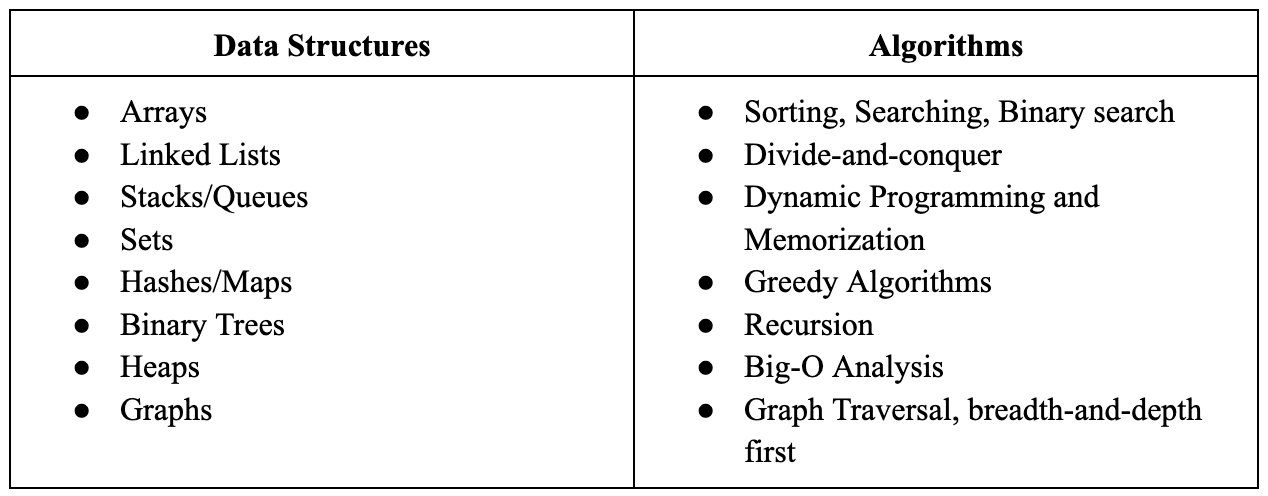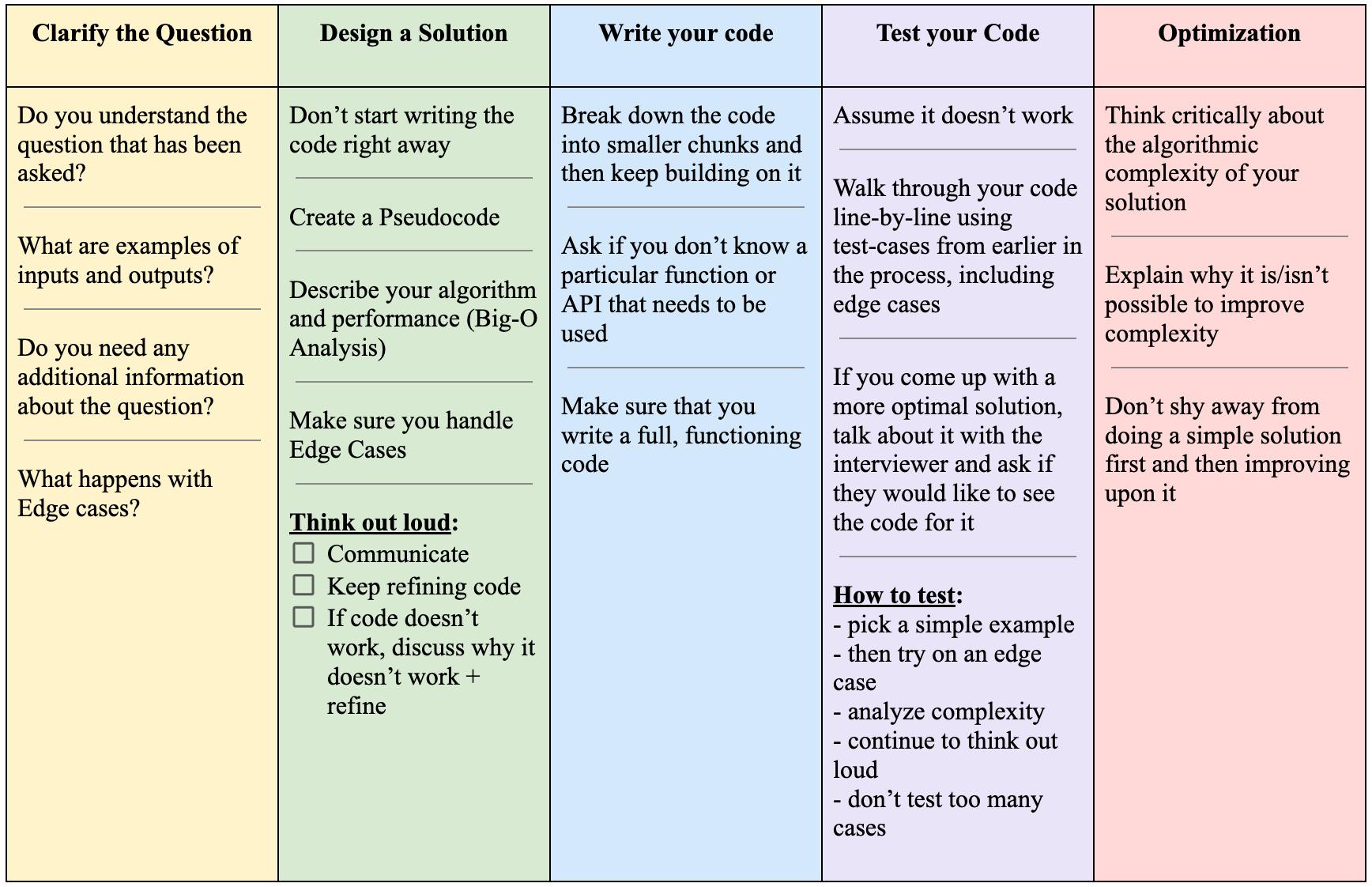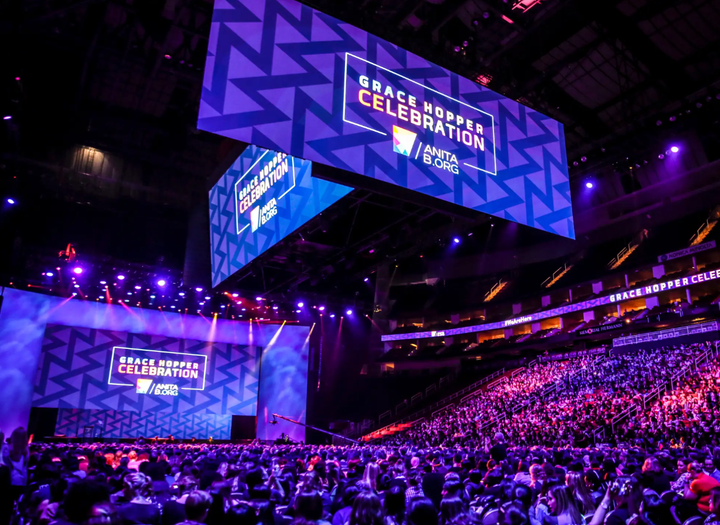Interview Tips I got from Google
Sharing some interview tips I learnt during my summer mentorship with Google!

Summer 2022, I got the opportunity to participate in Google's Software Product Sprint Program. This selective program aims to expose CS students to the industry by helping them build their portfolio, practice industry's best code review and collaboration practices, and give Interview prep tips and tricks. On the technical side, I learnt a lot about frontend development, backend development, Google Cloud Platform, NoSQL database, and contributing on GitHub through Git. For someone interested in exploring a career in software development, I believe this program to be a helpful insight into the CS industry.
Disclaimer!
Please keep in mind that I have no personal experience giving interviews. I am using my platform to simply relay the information and advice I have gotten during the mock-interviews I gave during the program. The goal of this post is to share my experience, help myself soak in what I learned, and help someone else along the way who's just getting started :)
Since ya girl doesn't wanna gate-keep, here's what I learnt during the Interview Coaching sessions lead by Google engineers and recruiters themselves. Some of these tips might be specific to Google itself, but I'll try keeping it as generalized as possible, while mentioning important notes about it for people who are trying to prep for a Google interview.
Resume Tips
Because I am no expert in this matter, I am only going to highlight tips that I found rather surprising as a beginner which most people seem to miss out on. However, if you want a more in-depth breakdown on what recruiters look for in resumes, I found this blog post on Medium to be particularly thorough and helpful.

Tip #1: Order matters
This one came as a rather shock to me as well as some of my peers that had just entered college. One would think that the interviewers go through the entire resume anyways, so as long as the order somewhat makes sense it should be okay, right? Not necessarily. When coming up with ordering of specific sections, always prioritize sections that accentuate personal growth more than an activity you do with a group of people. Your resume needs to be about you and what YOU have accomplished, more than what you were forced/peer-pressured to accomplish. Most companies are looking for what you can do as an individual and thus, would rather ignore most of the student organizations or group work that you have done during college. It is good to have it as a list somewhere on your resume to highlight soft skills, but know that it is probably not going to matter much in recruiter's decision making.
Order matters in every aspect of a resume. From choosing an order for sections to choosing an order for the technical skills, whatever you put first is immediately thought of as your strong suit. The reason this is particularly important is because most people order their experiences section chronologically from most recent to least. But, one should rather do it from what they know the best to least. The recruiters are most probably going to ask you to explain what you did during one of your projects. You want to be able to provide in-depth explanation of what you did, how you did it, and be ready for any follow-up questions about a specific skill.
I will touch on this more in depth with my second tip, but for Google, recruiters expect the Skills section to be above your Experiences section and not towards the very end. I have found this to be a trend with Microsoft as well, although the preference didn't seem to be as loud, clear, and consistent for them as it did for Google. And just for more context, I have read through several resumes that got rejected and accepted by both the companies, and have had in-depth discussion with their recruiters about my resume during the Grace Hopper Conference which is where I am drawing my conclusions from.
Tip #2: Know What the Company Wants
This might not be applicable to small companies. But the industry giants such as Google, Microsoft, Meta, NVIDIA, etc. always have some courses that you can do, especially for Interviews. If not courses, they probably have some founding principles that they expect sincere interviewees to know. Google, in particular, has two courses for example – one for interview prep and another one for data structures and algorithms. The courses subtly highlight their preferences during an interview or on a resume which is great to look out for when interviewing for these companies. Amazon, as another example, has Leadership Principles that they judge every resume and base every interview off of. For Amazon, if you can highlight "Customer Obsession" in your experiences section, you are almost guaranteed an interview. Most big companies are very proud of their founding principles and tailoring your resume accordingly helps a lot.
Let me provide more clarification on how you can tailor an experience according to what a company is looking for. This comes down to what Skills you lead with, verbs that you use to describe your skills, formatting choices to highlight certain parts of your resume, etc. It is extremely important to be very intentional with every word, formatting style, activity, and order that you choose to put on your resume; and your goal should be to make those choices based on the preferences of the company you're applying to.
Interview Tips
Assessment Criteria:
- Communication and Collaboration
- Grasp of Data Structures and Algorithm
- Understanding of your code as well as the Programming Language
- Problem Solving and Analytical Skills
Behavioral Assessment:
Tip #1: Always have follow-up questions
Usually after the interview, they ask you if you have any questions for them. TAKE THAT OPPORTUNITY. It won't hurt to not have any questions, but preparing some questions about the company beforehand would only help you stand out a bit, connect with your interviewer, and show your interest in the company's goals. As for what you should ask, you can ask about anything. Good topics would be about the company, their projects, the interviewer's experience with the company etc. Doing a bit more research on the company itself would lead you to having a lot of questions for the interviewer.
Tip #2: Listen
Focusing your attention on listening rather than responding would help showcase how agreeable you are as a person. It will help you answer any questions pertaining a Hypothetical Situation or your background and even help you come off a lot calmer than you might feel in the moment.
Tip #3: Showcase deeper thinking
One thing that I personally hadn't thought of before I took a Mock Interview was how important it is showcase your thinking. Obviously the interviewer can't read your mind. This makes it incredibly important for you to, first, practice speaking about some of the obvious scenarios like a difficult period of your life, most crucial project you have worked on, etc. And second, to dive a bit deeper into your thinking and understanding of the world. At the end of the day, that's what Behavioral Assessments come down to. How do you do that? I personally haven't fully mastered this, but my interviewer suggested "Don't try to narrate your story, help the listener feel your story".
Technical Assessment:
Topics You Should Know:

Interview Considerations:
- How did they analyze the problem?
- Did they miss any special or edge cases?
- Did they understand the problem methodically and logically?
- Do they have a strong foundation of the basic CS concepts?
- Did the candidate produce working code?
- Did the candidate test their code?
- Is their code clean and easy to read and maintain?
- Can the candidate explain their ideas clearly?
How to Ace the Technical Interview:
These suggestions come straight from the workshops hosted by recruiters at Google during the summer program I attended. I simply tried to compile a rubric of all the different steps one should hit during their technical assessment.

That's it! I would suggest exploring every point I discussed a lot more in depth. I believe I simply grazed the tip of the iceberg and there is a lot more consistent practice that is needed for any interview. I would highly suggest doing the free courses offered by Google that go over all the Data Structure concepts as well as give Interview Prep tips. There is also one from Microsoft that goes over how to build your resume and suggests best practices during an interview.
I believe the interview process simply comes down to the amount of practice you do. My goal for this blog post was to give your practice a direction so you knew what techniques to focus on and which ones to forgo. I also suggest reading more blog posts on platforms such as Medium. I have found several articles discussing their interviews with certain companies that you can draw valuable information from.
I hope this was helpful :)



